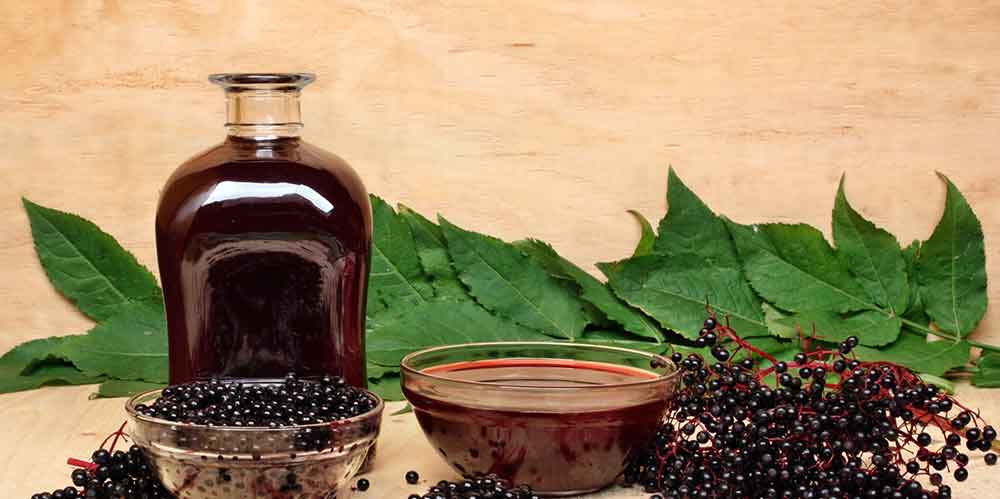Elderberry (Sambucus nigra)
“I wonder if they have coronavirus?”
It’s March 17, 2020, and, when otherwise people would be out celebrating St. Patrick’s Day, regardless of the presence or absence of Irish heritage, instead the masses are holed up inside, wondering how long their food stores, toilet paper, and savings/retirement accounts would hold up. The recommended crowd size seems to be following the path of the Dow Jones Industrial Average: three days ago, 250 and 24,000, respectively, whereas today it’s 10 and 20,000. For the errant errand, one looks at the other people out there: “I wonder if she has coronavirus?” “Did he touch this door knob, and now I have to find hand sanitizer?” At the same time, the cool air caused my nose to run, as it is wont to do, but I wiped my nose and then looked around to make sure no one saw me. I’m sure I would be judged and deemed an infectious risk, just as I had been looking around sizing up my human competition, wondering about their corona status. And, in one of my last face-to-face work meetings yesterday, I noticed a colleague touch his nose, and, later, rub his eyes; isn’t the news saying that we shouldn’t be doing that? Do I say something? The bottom line is that these are strange times.
Plants for healing in turbulent times
With many experts predicting a collapse of the regular medical system should the coronavirus take firm hold on the United States, people are turning instead to their trusty herbal medicines. It’s not a surprise. When allopathic medicine fails, or is even perceived to fail, there is an uptick in people seeking out integrative therapeutics. Plants may have a particularly interesting role in these circumstances, as evidence by cultures throughout the world who, for years, have used herbal medicines to treat various infections, and prevent their spread by keeping people (and their immune systems) healthy, resilient, and strong. But, if we focus on viral infections, which plants should be used when? The answer to this is complicated, mostly due to the fact that there are hundreds of types of virus that are constantly mutating (hence the need for an ever-changing flu shot) and that each individual’s immune system has nuances that are genetically and environmentally determined. That said, there are some winner anti-viral plants out there that everyone should be aware of.
Black elderberry’s physiological effects
I’ve always been intrigued by black elderberry (Sambucus nigra, Caprifoliaceae), both because of its ubiquity, and because there just isn’t much else in the Western medicine arsenal that is useful against the influenza virus. A syrup from the berries is a common form of treatment, and even this adds to the allure; who doesn’t like a sweet syrup, which might even bring them back to childhood when a caregiver dispensed a teaspoon of medicine during a time of sickness? We should be grateful to be alive now; there are notes from my family history of using a teaspoon of turpentine to treat various illnesses on the farm. I’d take black elderberry any day.
Flavonoids
As with any of the berries fit for human consumption, the color (such as blue, black, red, and orange) indicates the presence of antioxidants, in this case a family of chemical compounds called flavonoids (more specifically, anthocyanins). Antioxidants do just that, prevent oxidation from occurring, but, even more, also work their way into the biochemical enzyme systems that affect the body’s development of or diminution of inflammation, and the overall activity of the immune system. Elderberry’s flavonoids take it another step by also directing inhibiting virus replication (Johnson, 2010). And, elderberry may help with influenza, and coronavirus and other common cold infections (Hawkins, 2019; Alschuler, 2020), though it hasn’t specifically been studied in the type of coronavirus, SARS-CoV-2, causing our current pandemic.
Herbal safety and the cytokine storm
While we’re on the topic of the pandemic, there is debate about the safety of elderberry in treating, or preventing SARS-CoV-2. Although there is some research that elderberry may affect coronaviruses (Alschuler, 2020), some people infected with SARS-CoV-2 experience an overactive immune system response (called a “cytokine storm”) which could be exacerbated by elderberry (Hawkins, 2019; Alschuler, 2020). These are theoretical hypotheses, based on mostly laboratory research or clinical trials extrapolated from research on other viruses. There are no clinical trials (as of this writing) specifically examining elderberry’s positive or negative effect on SARS-CoV-2; this is imperative before being able to make a recommendation about using elderberry during this pandemic. Stay tuned to research studies as this is constantly changing and new research might surface that guides our clinical practice.
References
- Alschuler L, et al. Integrative considerations during the COVID-19 pandemic. Explore. 2020
- Johnson RL, Foster S, Low Dog T, Kiefer D. National Geographic Guide to Medicinal Herbs. Washington D.C.; National Geographic: 2010
- Hawkins J, Baker C, Cherry L, Dunne E. Black elderberry (Sambucus nigra) supplementation effectively treats upper respiratory symptoms: A meta-analysis of randomized, controlled clinical trials. Complement Ther Med 2019;42:361-365. doi.org/10.1.16/j.ctim2018.12.004


